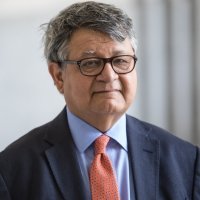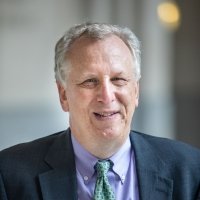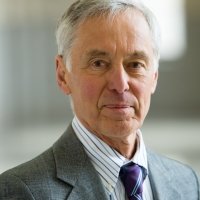G20 Beyond U.S.-China Tensions: What the G18 Want and Need
Trade concerns continue to blight the outlook for global growth as the leaders of the world’s most influential countries gather in Osaka, Japan in late June. While relations between the United States and China will invariably be the focus of attention during the G20 summit meeting, the annual event is also a chance for key powers to address common threats and challenges beyond the ongoing tensions of the world’s biggest economies. Join us for a discussion on the unique opportunities the G20 provides to coordinate national economic policies multilaterally on the one hand, and the obstacles facing the group of countries of various stages of development and systems of governance on the other.
Selected Quotes
Suman Bery
“Some of the issues that matter a great deal to Abe like free flow of digital information, the revival of the WTO; these present domestic challenges for India, because India continues to argue… “Look, we may be a large economy and we may be a fast growing economy, but we remain, by far, the poorest economy in terms of per capita income of all the members of the G20.”
“This, I think, is going to be an important tension in the way Prime Minister Modi tries to navigate at the G20: to be responsible, but not, in a sense, to be catapulted into a set of obligations that he would see as inconsistent with India’s development needs.”
“The rich countries, represented by the G7, have a tradition of cooperating with each other, and the others are newcomers. I think ten years on now…we are dealing with two rogue states—China and the United States. Where does that leave everybody else? And I think that’s what we should be beginning to tease out of what happens at Osaka.”
“I think a big issue is: does the world any longer want or believe in fast growth? I had my earlier career in the World Bank, and there was a sense that growth was a route to reduction of poverty. It was a route to stimulate demand, and it was a route to peace. And I think what we’ve seen since the global financial crisis is much more ambivalence about whether growth is a global value or not. And I would say, underlying many of the debates at the G20, this is an underlying issue.”
William Pomeranz
“I think that is really Putin’s objective: to show that despite all the problems that have occurred, despite all of the efforts of the Europeans and the United States to impose sanctions on Russia, Russia is still an important country, an engaged country, and is not an isolated country.
“I think [Putin] wants to show that he is engaged, that Russia is treated as an equal, and that Russia has an important role to play on the international stage—even if it is not, quite frankly, one of the major economic players in global trade.”
“If one wants to be optimistic, one could think that…it will be a good thing for Russia to engage in dialogue with the United States, and for Putin to meet Trump. That being said, I don’t want to underestimate the baggage that will come to that meeting in terms of election interference, sanctions, pipeline debates, nuclear weapons, etcetera.”
Earl Anthony Wayne
“I think the main interest of President Macri in going this time is to be present, to be seen, to help maintain support for the reforms that he’s undertaking, and the support he’s gotten from the International Monetary Fund.”
“You’re going to have, throughout these discussions—trade, macro-growth, and climate—as issues where it will likely be the United States in one corner, and many others in another corner.”
David Ottaway
“The Crown Prince, who’s representing Saudi Arabia [at the G20], Mohammad bin Salman, is using every international occasion to appear, [and] to overcome his responsibility for the assassination of Jamal Khashoggi, a Saudi journalist who was taking him on in the columns of The Washington Post.”
“For the government of Saudi Arabia, all eyes are on this summit. If they do not agree, and there is a further slump in world trade, there will certainly be a further slump in oil demand.”
Marvin Ott
“President Jokowi has made it clear from the outset that his priorities are domestic within Indonesia, and he has very little patience for, and relatively little interest in, the grand events that take place on the regional and international stage.”
“Indonesia is, by far, the largest, most important country, by any measure, in Southeast Asia. Population of 270 million. Geographically, if you overlay Indonesia on North America, it would extend from Seattle to Bermuda. Huge, diverse country. World’s largest predominately Muslim country. Third largest democracy. Rapidly growing economy. Indonesia is a big deal. But Indonesia shows relatively little inclination in asserting itself in the ways that, for example, China is clearly doing on the Asian stage on steroids.”
More quotes to come...
Speakers

Non-resident Fellow, Bruegel (Brussels)


Former Career Ambassador to Afghanistan, Argentina, and Mexico; Distinguished Diplomat in Residence, School of International Service, American University

Former Washington Post Middle East Correspondent

Adjunct Professor, Johns Hopkins University; Former Professor of National Security Policy, National War College and Deputy Staff Director, Senate Select Committee on Intelligence
Moderator

Hosted By

Indo-Pacific Program
The Indo-Pacific Program promotes policy debate and intellectual discussions on US interests in the Asia-Pacific as well as political, economic, security, and social issues relating to the world’s most populous and economically dynamic region. Read more


Hyundai Motor-Korea Foundation Center for Korean History and Public Policy
The Center for Korean History and Public Policy was established in 2015 with the generous support of the Hyundai Motor Company and the Korea Foundation to provide a coherent, long-term platform for improving historical understanding of Korea and informing the public policy debate on the Korean peninsula in the United States and beyond. Read more


Kennan Institute
After more than 50 years as a vital part of the Wilson Center legacy, the Kennan Institute has become an independent think tank. You can find the current website for the Kennan Institute at kennaninstitute.org. Please look for future announcements about partnership activities between the Wilson Center and the Kennan Institute at Wilson Center Press Room. The Wilson Center is proud of its historic connection to the Kennan Institute and looks forward to supporting its activities as an independent center of knowledge. The Kennan Institute is committed to improving American understanding of Russia, Ukraine, Central Asia, the South Caucasus, and the surrounding region through research and exchange. Read more


Latin America Program
The Wilson Center’s prestigious Latin America Program provides non-partisan expertise to a broad community of decision makers in the United States and Latin America on critical policy issues facing the Hemisphere. The Program provides insightful and actionable research for policymakers, private sector leaders, journalists, and public intellectuals in the United States and Latin America. To bridge the gap between scholarship and policy action, it fosters new inquiry, sponsors high-level public and private meetings among multiple stakeholders, and explores policy options to improve outcomes for citizens throughout the Americas. Drawing on the Wilson Center’s strength as the nation’s key non-partisan policy forum, the Program serves as a trusted source of analysis and a vital point of contact between the worlds of scholarship and action. Read more


Argentina Project
The Argentina Project is the premier institution for policy-relevant research on politics and economics in Argentina. Read more
